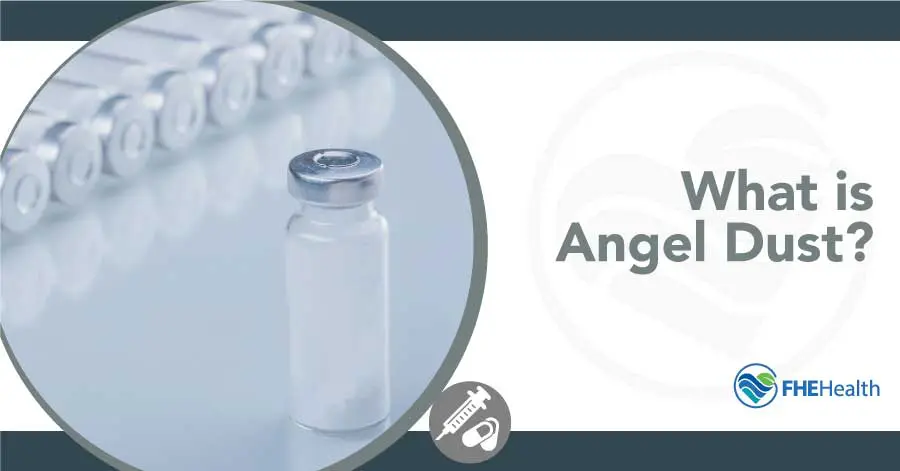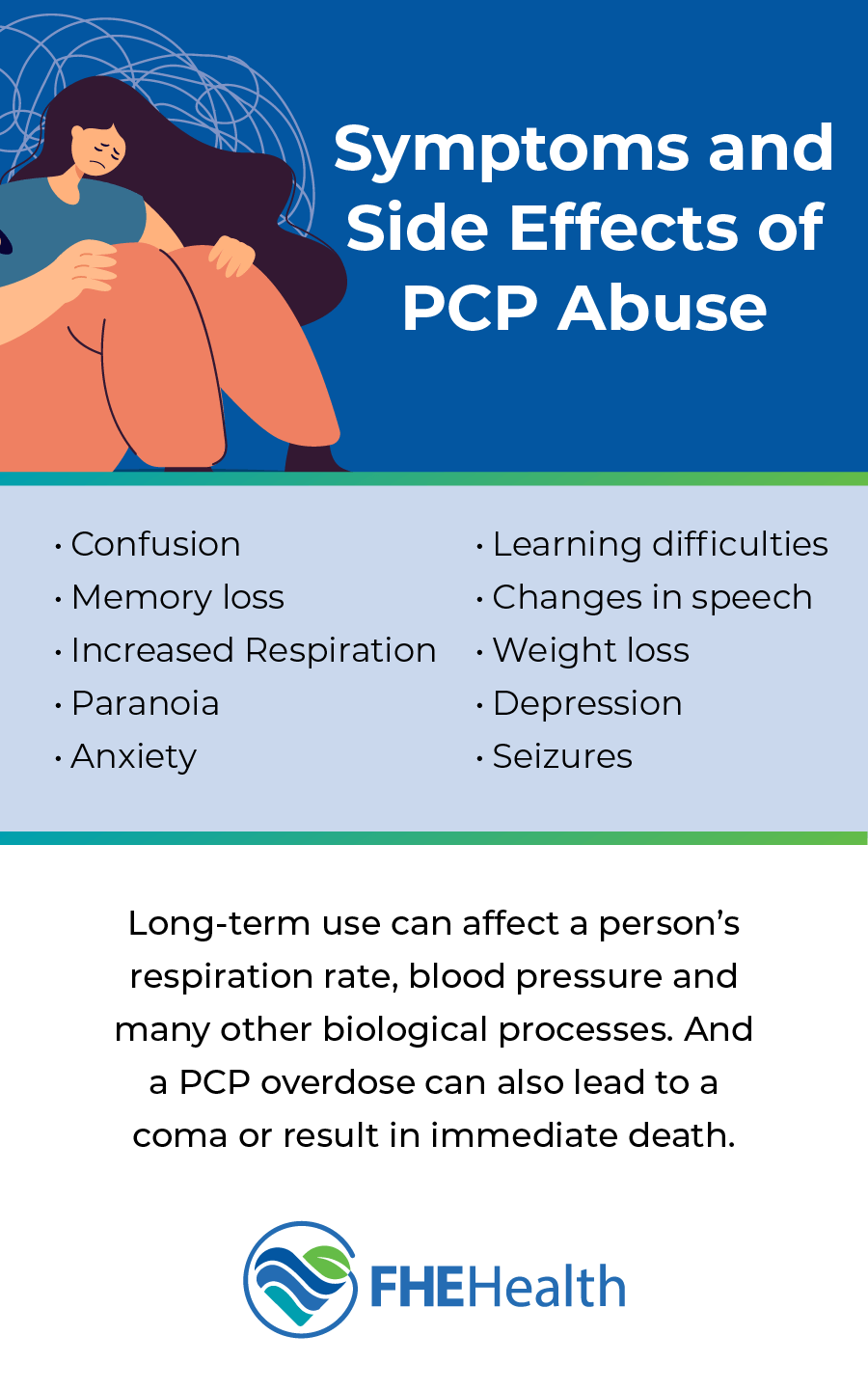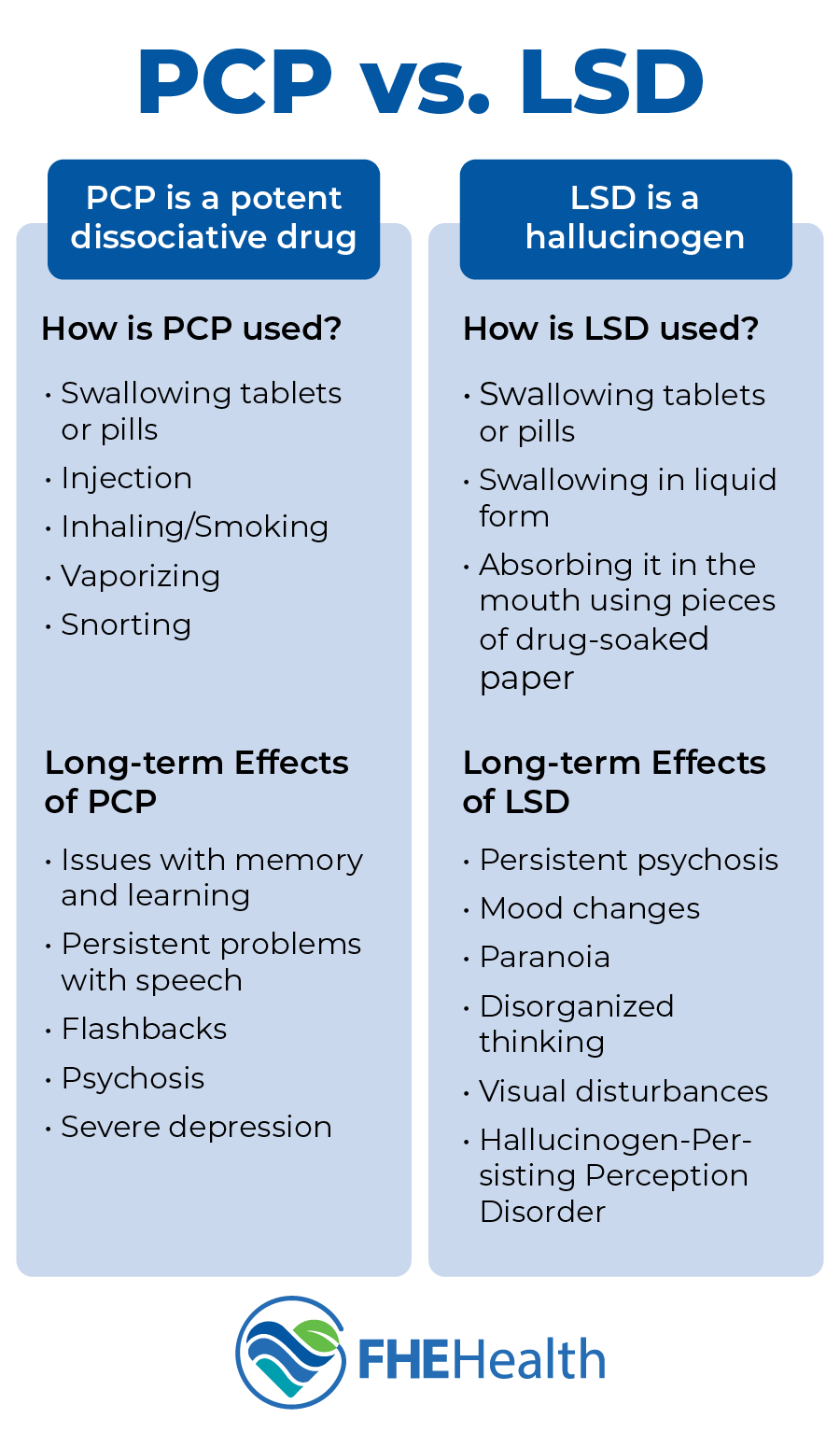
Angel dust, also known as PCP (phencyclidine), is commonly found as a white powder. This powder may be smoked, eaten, snorted or injected. The drug was first developed as an anesthesia for use during surgery and other medical procedures. When its toxic effects became known, it was quickly removed from use in hospitals.
However, PCP soon found a home on the streets due to its powerful dissociative effects and ability to cause hallucinations. PCP is rarely consumed alone today. It’s often sold in conjunction with other illicit drugs to create a more powerful high and add an addictive element.
High-profile deaths due to angel dust overdoses, such as Anissa Jones (“Buffy” in Family Affair) in the 1970s, are relatively rare. However, hospitalization rates for PCP increased more than 400% over a six-year span from 2005-2011, according to the Drug Abuse Warning Network (DAWN) report. The Substance Abuse and Mental Health Services Administration regularly publishes the DAWN report to track usage and treatment statistics.
Identifying Angel Dust
 So, how can someone recognize angel dust when looking at various pills, powders and other unidentified substances? In its purest form, PCP is a snow-white crystalline powder. On the street, it’s often cut with other substances to increase profits.
So, how can someone recognize angel dust when looking at various pills, powders and other unidentified substances? In its purest form, PCP is a snow-white crystalline powder. On the street, it’s often cut with other substances to increase profits.
Depending on the substance used to cut the PCP, it can vary from pale white to dark brown in color. The consistency can vary from a powder to a moist, almost tarry substance. PCP pills can range in color from white to dark brown and may have various production stamps, all from illicit sources.
What Is Angel Dust Made Of?
PCP is a synthetic chemical made in a lab. When dissolved into a liquid form, it’s highly flammable since the suspension liquid used is typically ether. By itself, PCP is a stable compound and can be dissolved in water and drunk. However, its distinctive bitter taste may be why it’s often sold in gelcap or pill form.
Some common street names for PCP include angel dust, rocket fuel and hog. Some other names may indicate what PCP is combined with. Marijuana and PCP are often packaged together and sold as whack, kools or supergrass. These names refer to weed that’s been sprayed or coated in PCP.
Some sellers may even offer angel dust weed at no upcharge to bring in new customers. After all, PCP is addictive, while marijuana isn’t. A study published by the National Institute of Health found that up to 24% of street marijuana is laced with PCP.
What Does PCP Do?
 Angel dust is often compared to hallucinogens such as acid (LSD) and ecstasy (MDMA). Like LSD and MDMA, PCP can cause hallucinations. However, it also has a dissociative effect, making users feel incredibly disconnected from the people and things around them. There’s no proven impact on strength enhancement related to PCP use. However, PCP can increase aggression and numb pain, which might be where the Hulk-like image of a user comes from.
Angel dust is often compared to hallucinogens such as acid (LSD) and ecstasy (MDMA). Like LSD and MDMA, PCP can cause hallucinations. However, it also has a dissociative effect, making users feel incredibly disconnected from the people and things around them. There’s no proven impact on strength enhancement related to PCP use. However, PCP can increase aggression and numb pain, which might be where the Hulk-like image of a user comes from.
Although PCP users don’t suddenly gain extra strength, they may still be able to punch through plate glass. Why? Someone high on PCP may not notice the broken bones in their hand following the punch. That’s why, although overdose deaths from PCP are relatively rare, deaths from misadventure while high on the drug are more common.
Dr. Beau A. Nelson, Chief Clinical Officer at FHE Health and long-time substance use disorder clinician, states, “PCP remains a drug of abuse in that it gives users the illusion of euphoria, omnipotence, superhuman strength, and social and sexual prowess, which is attractive to someone suffering or in a low place, although it is completely delusional and short-acting.”
Common Effects of PCP Use
When a person is on PCP, the drug can also block memories, emotions and pain. This euphoric effect can make it powerfully attractive for those with significant trauma in their past.
Some other common effects of PCP include:
- Numbness
- Lack of coordination
- Confusion
- Agitation
- Delusions
- Muscle rigidity
- Hypertension
- Tachycardia
The delusions of increased physical capabilities are fairly common among angel dust addicts. This may let some users feel powerful in response to a past that leaves them feeling helpless.
Addiction to Angel Dust
Every drug has certain effects that may be part of every cycle of getting high and coming back down. With PCP, euphoria, hallucinations and feelings of detachment and invulnerability may lead to repeat use and eventual addiction.
Short-Term and Long-Term Effects
After use, side effects can range from short-term bouts of confusion to memory loss and increased respiration. Memory loss can occur while a person is on the drug, or it can extend to encompass additional memories. Paranoia and anxiety can combine to create a powerful isolating effect in those coming down from a PCP high. Along with the physical dependency the drug creates, that isolation can contribute to addiction.
When a person becomes addicted to any substance or activity, there’s also the potential for side effects such as anxiety and depression. And these side effects tend to worsen when attempting sobriety.
Common Symptoms of PCP Abuse
Other symptoms of PCP abuse might include:
- Memory loss
- Learning difficulties
- Changes in speech
- Weight loss
- Depression
- Seizures
The Dangers of PCP Delusions and Overdose
The feelings of invulnerability, hallucinations or delusions a PCP user experiences can lead to fatal errors in judgment. Someone high on PCP may not realize they’re walking off a cliff and can’t fly. Long-term use can affect a person’s respiration rate, blood pressure and many other biological processes. A PCP overdose can also lead to a coma or result in immediate death.
Signs of PCP Use in Others
If you’re concerned that a loved one might be using PCP, check for weed or other greenery that might be covered in a powder. Also, look for liquid forms of PCP that someone might use to dip a cigarette. Liquid for dipping is an increasingly popular method of getting high with angel dust.
PCP vs. LSD
Both PCP and LSD are powerful mind-altering drugs. They work by altering bodily senses of sight, sound, touch, taste, and smell, as well as personal feelings and thoughts. When people use PCP or LSD, they typically intend to break from reality, if only temporarily. They may be eager to explore the feeling of detachment or deliberately try to have visions that provide spiritual or mystical enlightenment or insight. The problem is, however, that recreational use of these drugs can lead to longer-term use, which can result in abuse and addiction.
PCP
The brain is the chief recipient of the effects of PCP, a potent dissociative drug. The use of PCP is most often for recreational or social purposes, as users specifically want to cope with stress, engage in a spiritual quest, or take part in something deemed fun, innocuous, or the “in” thing to do.
PCP is used in several ways, including swallowing pills or tablets, injecting the drug, inhaling, smoking, vaporizing, or snorting.
After discontinuing PCP use, people often experience withdrawal symptoms such as headaches, sweating, and drug cravings. Beyond withdrawal symptoms, long-term effects of PCP use include issues with memory and learning, persistent problems with speech, flashbacks, psychosis, and severe depression.
LSD
LSD is a hallucinogen. Among mind-altering chemicals or drugs, LSD is considered one of the most powerful. Moreover, LSD use can induce or trigger a schizophrenic or psychotic state in some at-risk individuals. Yet one of the most frightening aspects of LSD use is that the user may experience terrifying flashbacks years after using a single dose of the powerful drug.
Common ways people use LSD include swallowing tablets or pills, swallowing in a liquid form, or absorbing it in the mouth using pieces of drug-soaked paper.
Long-Term Effects of LSD Use
There are at least two long-term effects of LSD use. Although they are relatively rare, they are serious. They include persistent psychosis and ongoing mental problems like mood changes, paranoia, disorganized thinking, and visual disturbances. Another long-term effect of LSD use is a condition called hallucinogen-persisting perception disorder. This involves flashbacks of some of the user’s past drug experiences. This effect is seen more often in those with a history of mental illness.
Tolerance and the Dangers of Increasing LSD Dosage
The drug LSD isn’t considered addictive in the strict sense. It doesn’t lead to intense drug-seeking behaviors. Yet using LSD results in tolerance to the drug, meaning that users who repeatedly take it must take increasingly higher doses to achieve the same desired effect. LSD is wildly unpredictable, however, so upping the drug dose is an unsafe practice that could have catastrophic consequences. Finally, using LSD is known to produce tolerance to other types of hallucinogens, which includes psilocybin.
How Long Does PCP Stay in Your System?
The effects of angel dust spray, angel dust strain, or even a PCP weed strain vary depending on how much a person uses. It has a half-life of about 21 hours. Yet it can be detected in the body for several days to months. How long it stays in your system depends on factors such as age, body mass, metabolism, dosage, usage frequency, hydration, and the type of drug test used in the analysis.
In general, PCP can be detected in the blood for up to 24 hours. In saliva, it’s 1-10 days, while for urine, it’s up to a month. Hair analysis can detect PCP for up to 90 days.
Addiction and Psychological Cravings
In consideration of what angel dust is and why someone should use it, it’s essential to recognize that while the effects can begin in just a few minutes and last for several hours, the drug can be addictive, according to the National Institute on Drug Abuse. This is an important consideration—besides the tremendous harm that can occur while under the influence of what is angel dust.
In high doses, PCP can result in coma, seizures, and death. Many people who have been high on PCP have attempted or succeeded at suicide or suffered a fatal injury in an accident.
So, while PCP can be cleared from the system over time, the residual psychological cravings that may remain are best treated with professional addiction treatment. Counseling, learning about the dangers of drug use, interaction with support groups, and crafting healthier lifestyle practices are solid foundations for a drug-free life.
Treatment for PCP Addiction
When looking for treatment for PCP withdrawal, it’s important to find a facility that offers emergency medical care. Detoxing from PCP is possible and survivable with appropriate medical care to monitor breathing, circulation and gastrointestinal function. Some people may require sedation and physical restraints to get past the worst side effects. Sedation is particularly helpful for individuals who become agitated or violent after taking PCP.
With PCP use, even asymptomatic patients should be monitored for at least six hours before being released. For long-term sobriety, transitioning to a residential treatment plan is recommended. Living sober after developing a PCP habit may require intensive therapy and long-term assistance.
Residential treatment programs have the highest success rate for those seeking to avoid a relapse. The longer the inpatient program, the longer a person tends to remain drug-free after discharge.
Addicted to Angel Dust? FHE Is Here to Help
If you or a loved one relies on illicit drugs such as angel dust to get through the day, reach out! Don’t be afraid to get help with both the underlying issues and your addiction. Our compassionate counselors are ready to offer a listening ear 24/7. Contact us today at (833) 596-3502 to start your journey to sobriety by entering our addiction recovery program.
FAQs About Angel Dust (PCP)
Q: Does PCP actually give people super strength? I’ve heard stories about people fighting off police while on it.
A: No. Angel dust does not make your muscles stronger; it completely shuts off your body’s “warning system.” PCP is a dissociative anesthetic. When someone punches through plate glass or fights off restraints, they are doing so because they cannot feel the bones breaking in their hands or the pain of the struggle. They are just operating without the physical cues that stop a sober person from injuring themselves.
Q: I thought I was just smoking marijuana, but I felt terrified and disconnected. Could it have been laced?
A: It is a possibility. This is what is known on the street as “wet,” “fry,” or “supergrass.” Dealers sometimes dip joints in liquid PCP (which is often dissolved in ether) to create a more intense, addictive high for unsuspecting buyers. If your “weed” tasted chemically bitter or made you feel numb, aggressive, or completely detached from reality rather than relaxed, you likely consumed PCP.
Q: Why is it called “dissociative”? What does that actually feel like?
A: Dissociatives make you feel disconnected from your surroundings entirely. People often describe it as feeling like a ghost in their own body, or watching themselves from across the room like a movie character. That detachment is what makes it lethal. When you don’t feel like you exist in the physical world, “rules” like gravity or pain don’t seem real anymore, and you lose the instinct to keep your body safe.
Q: How can I tell if a powder or pill is actually Angel Dust?
A: It is very difficult to tell by sight alone. In its pure lab form, it is a white crystalline powder. But on the street, it is usually “cut” (mixed) with other substances to boost dealer profits, making it look like anything from a tan powder to a dark, gummy brown tar. Because it is made in illicit labs with no quality control, you never truly know the potency or purity of what you are taking.
Q: Is the damage permanent, or does it go away once the drug leaves your system?
A: While the drug leaves your blood in about 24 hours, the damage can linger much longer. PCP is notorious for causing “flashbacks” or persistent psychosis. This means you could experience a frightening hallucination or a state of panic weeks or even years after you last took the drug. It can also trigger underlying mental health issues like schizophrenia in people who were already at risk.
Q: What should I do if I think someone is overdosing or having a “bad trip” on PCP?
A: You need to get medical help immediately, but be extremely cautious. Because the person may be hallucinating and feeling no pain, they can become violent or unpredictable in a split second. Do not try to “talk them down” like you might with other drugs. They need professional sedation and medical monitoring to ensure their heart rate and breathing don’t fail while the drug clears their system.






